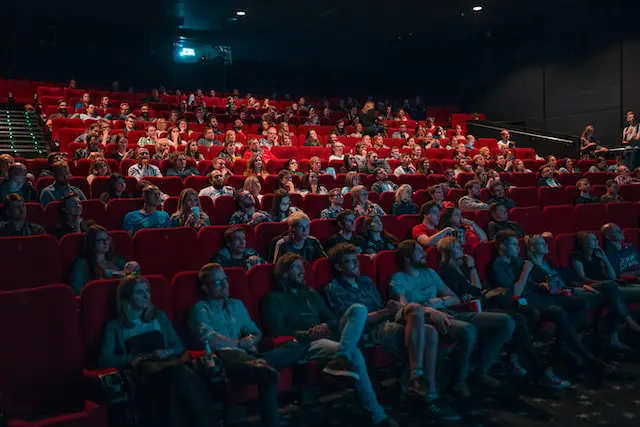We hope you love the products we recommend! Just so you know, we may collect a share of sales or other compensation from the links on this page. Thank you if you use our links, we really appreciate it!
Movie theaters have been a staple in the entertainment industry for decades, providing audiences with a larger-than-life viewing experience. One of the most iconic pieces of technology associated with movie theaters is the projector. However, with the rapid advancement of technology, it begs the question: do movie theaters still use projectors?
The short answer is yes, many movie theaters still use projectors to show films. However, the technology behind these projectors has evolved significantly in recent years. Gone are the days of the bulky, noisy film projectors that required constant maintenance. Today’s digital projectors are much smaller, quieter, and more reliable. They also offer a higher resolution and a wider color gamut, providing audiences with an even more immersive viewing experience.
But while traditional projectors are still in use, they are facing competition from newer forms of projection technology such as LED and laser projectors. These newer technologies offer even higher resolution and brightness, and can be used for much larger screens. They are also more energy efficient and have a longer lifespan than traditional projectors.
The rise of streaming services, such as Netflix and Hulu, has also had a major impact on the film industry. With more people choosing to watch movies at home, movie theaters have had to adapt in order to stay relevant. Many theaters are now incorporating new technologies, such as 3D and 4D experiences, in order to offer a unique and immersive experience that can’t be replicated at home.
In this blog, we will take a closer look at the current state of movie theaters and the technology they are using to show films. We’ll discuss the pros and cons of traditional projectors and newer forms of projection technology, and explore how the film industry is adapting to the changing landscape of entertainment. So, whether you’re a film buff or just curious about the technology behind movie theaters, this blog has something for you.
Table of Contents
Do Movie Theaters Still Use Projectors?
Yes, many movie theaters still use projectors to show films. The technology behind these projectors has evolved significantly in recent years. Traditional film projectors have been replaced by digital projectors which are smaller, quieter, more reliable and offer a higher resolution and a wider color gamut.
Digital projectors use a digital light processing (DLP) chip or a liquid crystal on silicon (LCoS) chip to project the image, which eliminates the need for film reels and allows for a wider range of content to be shown. The most common type of digital projector used in movie theaters today is the 2K Digital Cinema Projector, which has a resolution of 2048 x 1080 pixels.
However, traditional projectors are facing competition from newer forms of projection technology such as LED and laser projectors. These newer technologies offer even higher resolution and brightness, and can be used for much larger screens. They are also more energy efficient and have a longer lifespan than traditional projectors. For example, laser projectors have a lifespan of around 20,000 hours compared to around 6,000 hours for traditional projectors.
While many theaters still use projectors, some have also begun to experiment with new forms of projection such as virtual reality and augmented reality. These technologies offer an even more immersive viewing experience and are becoming more popular in the industry.
What Kind of Projectors do Movie Theaters?Use
Movie theaters use a variety of different types of projectors, but the most common type is the digital projector. Digital projectors use a digital light processing (DLP) chip or a liquid crystal on silicon (LCoS) chip to project the image, eliminating the need for film reels and allowing for a wider range of content to be shown.
The most common type of digital projector used in movie theaters today is the 2K Digital Cinema Projector, which has a resolution of 2048 x 1080 pixels. This type of projector is used for 2D and 3D movies and can project the image on screens up to 100 feet wide.
Another popular type of projector used in movie theaters is the 4K Digital Cinema Projector, which has a resolution of 4096 x 2160 pixels. This type of projector is used for 2D and 3D movies and can project the image on screens up to 120 feet wide. These projectors are becoming more popular as it can produce sharper, more vibrant and detailed image compared to 2K projectors.
In addition to digital projectors, movie theaters also use other forms of projection technology such as LED and laser projectors. These newer technologies offer even higher resolution and brightness, and can be used for much larger screens. They are also more energy efficient and have a longer lifespan than traditional projectors. For example, laser projectors have a lifespan of around 20,000 hours compared to around 6,000 hours for traditional projectors.
When did movie theaters stop using projectors?
Movie theaters have not stopped using projectors altogether, but the technology behind them has evolved significantly in recent years. Traditional film projectors, which used celluloid film reels, have been gradually phased out and replaced by digital projectors.
The transition from film to digital projection began in the late 2000s, with the introduction of digital cinema packages (DCPs). DCPs are digital copies of movies that can be played on a digital projector, eliminating the need for film reels. This allowed for a wider range of content to be shown and made it easier for studios to distribute movies to theaters.
The transition from film to digital projection was not immediate, as it required a significant investment from theaters to upgrade their projection equipment. Many theaters also had to deal with the additional cost of purchasing or renting digital copies of movies. However, as the cost of digital projection equipment decreased, and more movies were made available in digital format, more and more theaters made the switch.
As of today, most of the movie theaters around the world have switched to digital projection, and the use of traditional film projectors has become increasingly rare. However, some theaters still use film projectors for archival or special screenings.
Conclusion
In conclusion, movie theaters still use projectors to show films, but the technology behind them has evolved significantly in recent years. Traditional film projectors have been replaced by digital projectors which are smaller, quieter, more reliable and offer a higher resolution and a wider color gamut. The most common type of digital projector used in movie theaters today is the 2K Digital Cinema Projector, and 4K Digital Cinema Projector is also becoming popular. In addition to digital projectors, movie theaters also use other forms of projection technology such as LED and laser projectors. These newer technologies offer even higher resolution and brightness, and can be used for much larger screens. They are also more energy efficient and have a longer lifespan than traditional projectors. The transition from film to digital projection in movie theaters began in the late 2000s, and most theaters have now made the switch to digital projectors. While traditional film projectors are not in widespread use, they are still used in some theaters for archival or special screenings. Theaters are also experimenting with new forms of projection such as virtual and augmented reality to offer a unique and immersive experience.

